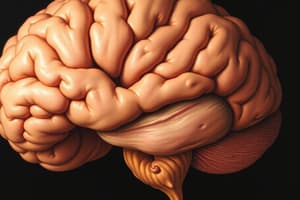Podcast
Questions and Answers
What is the primary function of hormones in the neuroendocrine system?
What is the primary function of hormones in the neuroendocrine system?
- To directly communicate with the nervous system.
- To enable one body system to regulate another. (correct)
- To act only on the organs they are synthesized in.
- To provide energy to body tissues.
Which lobe of the pituitary gland originates from the pharynx?
Which lobe of the pituitary gland originates from the pharynx?
- Posterior pituitary
- Median eminence
- Anterior pituitary (correct)
- Infundibulum
What distinguishes steroid hormones from peptide hormones?
What distinguishes steroid hormones from peptide hormones?
- Steroid hormones have shorter half-lives than peptide hormones.
- Steroid hormones are synthesized from cholesterol. (correct)
- Peptide hormones can easily cross cell membranes.
- Steroid hormones are released by the pituitary gland.
What is the role of peptide hormones in the endocrine system?
What is the role of peptide hormones in the endocrine system?
How does the neuroendocrine system contribute to homeostasis?
How does the neuroendocrine system contribute to homeostasis?
What is the primary mechanism by which the hypothalamus regulates hormone levels in the body?
What is the primary mechanism by which the hypothalamus regulates hormone levels in the body?
Which of the following hormones is directly secreted by the anterior pituitary gland?
Which of the following hormones is directly secreted by the anterior pituitary gland?
Which of the following is a classification of hormones secreted by distal target organs?
Which of the following is a classification of hormones secreted by distal target organs?
What is the role of releasing and inhibiting hormones secreted by the hypothalamus?
What is the role of releasing and inhibiting hormones secreted by the hypothalamus?
How do hormones from the anterior pituitary generally reach other parts of the body?
How do hormones from the anterior pituitary generally reach other parts of the body?
What is a key characteristic of hormone feedback mechanisms in the endocrine system?
What is a key characteristic of hormone feedback mechanisms in the endocrine system?
What is a common feature of peptide hormones compared to steroid hormones?
What is a common feature of peptide hormones compared to steroid hormones?
Which hormone is NOT a type of gonadotrophin produced by the anterior pituitary?
Which hormone is NOT a type of gonadotrophin produced by the anterior pituitary?
What type of feedback mechanism is primarily used to maintain homeostasis of hormone levels?
What type of feedback mechanism is primarily used to maintain homeostasis of hormone levels?
Which hormone is secreted by the anterior pituitary gland?
Which hormone is secreted by the anterior pituitary gland?
How are steroid hormones classified?
How are steroid hormones classified?
Which statement accurately describes peptide hormones?
Which statement accurately describes peptide hormones?
What are the three types of intercellular signals recognized in cell communication?
What are the three types of intercellular signals recognized in cell communication?
What is the main function of the pituitary gland?
What is the main function of the pituitary gland?
Which hormone functions as a second messenger in signal transduction?
Which hormone functions as a second messenger in signal transduction?
In which situation would a positive feedback loop be most likely to occur?
In which situation would a positive feedback loop be most likely to occur?
Study Notes
Hypothalamus and Anterior Pituitary Gland
- Hypothalamus: Contains neurons that project to the median eminence.
- Median Eminence: Receives releasing and inhibiting hormones from hypothalamic neurons.
- Portal Blood System: Carries releasing/inhibiting hormones from the median eminence to the anterior pituitary.
- Anterior Pituitary: Contains cells that secrete hormones in response to releasing/inhibiting hormones from the hypothalamus.
- Hormones from Anterior Pituitary: Travel throughout the body.
Homeostasis of Hormone Levels
- Feedback Regulation (Usually Negative Feedback):
- Hypothalamus releases releasing/inhibiting hormones.
- Anterior pituitary releases trophic hormones.
- Trophic hormones stimulate distal target organs/glands to release hormones.
- This results in a feedback loop where hormones from distal target organs/glands can suppress the release of releasing/inhibiting hormones from the hypothalamus and/or trophic hormones from the anterior pituitary.
Endocrine/Neuroendocrine System
- Hormones: Chemical messengers that regulate body systems.
- Hypothalamus and Pituitary: Major regulators of the endocrine system.
- Hypothalamic-Pituitary-Gonadal Axis (HPG): Key pathway in reproduction, involving the hypothalamus, pituitary gland, and gonads.
Pituitary Gland (Hypophysis)
- Structure:
- Two lobes with different origins:
- Anterior Pituitary (Adenohypophysis): Originates from the pharynx.
- Posterior Pituitary (Neurohypophysis): Originates from the brain.
- Connected through the infundibulum.
- Hypothalamus: Controls both lobes of the pituitary gland.
Steroid vs Peptide Hormones
- Steroid Hormones:
- Synthesized as preprohormones, requiring processing.
- Lipophilic (fat soluble), can cross cell membranes.
- Travel in blood with carrier proteins.
- Bind intracellular receptors.
- Signal by directly changing gene expression.
- Examples: Oestradiol-17β, progesterone, testosterone.
- Peptide Hormones:
- Synthesized as preprohormones, requiring processing.
- Water-soluble, cannot cross cell membranes.
- Freed into circulation directly.
- Bind cell surface receptors.
- Signal through secondary messenger systems.
- Examples: GnRH, FSH, LH.
Key Concepts
- Intercellular Chemical Signals: Allow cells to communicate across distances.
- Autocrine Signaling: Signals act on the same cell that released them.
- Paracrine Signaling: Signals act on nearby cells.
- Endocrine/Neuroendocrine Signaling: Signals act on distant targets by traveling through blood.
- Hypothalamus and Pituitary: Key regulators of the endocrine system.
- Pituitary Gland Structure: Two lobes (anterior and posterior) with different functions.
- Hormone Regulation: Homeostasis is maintained using feedback loops.
- Steroid vs. Peptide Hormones: Differences in synthesis, solubility, receptor binding, and signaling mechanisms.
Studying That Suits You
Use AI to generate personalized quizzes and flashcards to suit your learning preferences.
Related Documents
Description
Test your knowledge on the hypothalamus and the anterior pituitary gland, including the roles of releasing and inhibiting hormones. This quiz will cover the function of the portal blood system and the feedback regulation in hormone levels. Understand the relationship between these components in maintaining homeostasis.



